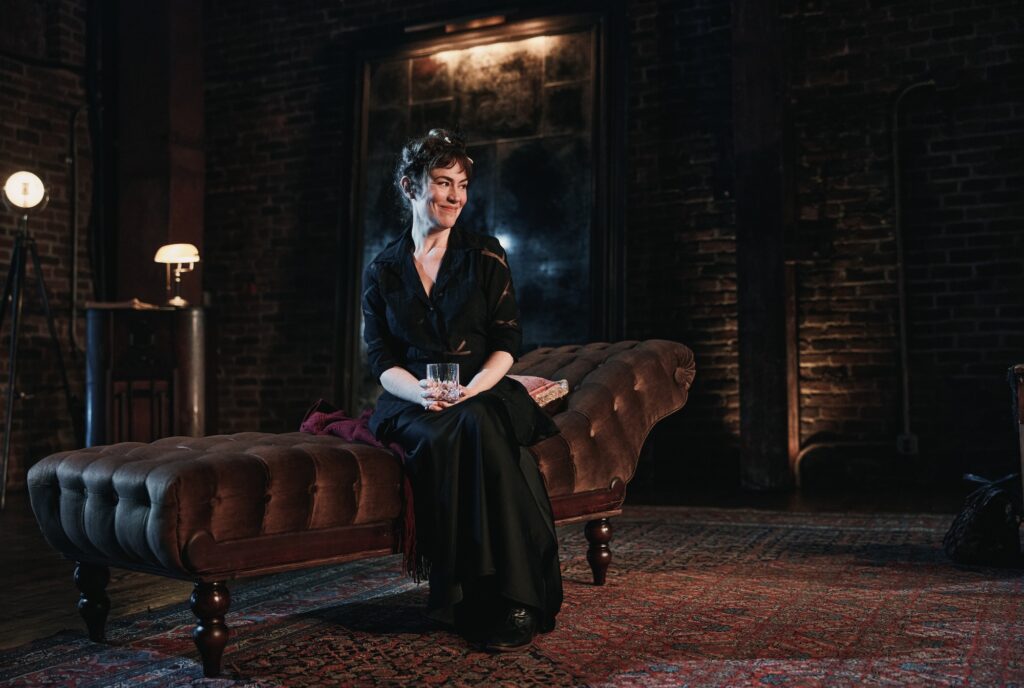In New Adaptation, Playwright Jen Silverman and Director Ian Rickson Emphasize Comic Aspects of ‘Creditors,’ a Strindberg Tragicomedy
Ultimately, this ‘Creditors’ is Liev Shreiber’s show. Witty, withering, and ultimately a little heartbreaking, the stage and screen veteran holds the audience rapt.

In a 1985 review of an August Strindberg biography that ran in the New York Times, a noted critic and author, Eric Bentley, wrote, drily, “Strindberg … was possessed by misogyny, as all the word knows: it is all the world does know about Strindberg.” The article, titled “Sweden’s Nasty, Sexist, Racist Genius,” ultimately defended the Scandinavian playwright, who like some other dead European and American men of distinction is remembered in certain factions more for his vices, perceived and real, than his accomplishments.
Gender certainly figures prominently in Strindberg’s “Creditors,” first staged in 1889. Less widely known than other naturalistic classics such as “Miss Julie” and “The Father,” the three-character play unfolds at a seaside resort where its sole female character, Tekla, a budding novelist enjoying praise for a roman à clef inspired by her first marriage, is staying with her second husband, Adolph, a struggling artist.
The third figure, an older man named Gustav, is more mysterious, as is his relationship to the other two. In a new production of “Creditors” — being presented in repertory with Hannah Moscovitch’s “Sexual Misconduct of the Middle Classes,” a play addressing related issues in a modern context — he is played by Liev Schreiber, who last appeared on the New York stage in a Broadway revival of “Doubt,” as a charismatic priest who may be involved in egregious misconduct.

Gustav, too, seems increasingly manipulative, and sinister, as he interacts with the others — first Adi, as the artist is identified here, and then Tekla, after she and Adi have had a heated exchange. That confrontation is the direct result of Adi’s discussion with Gustav, who expertly chips away at the younger, gentler man’s faith in himself and his marriage, for reasons that become clear later in the play.
Indeed, it’s Gustav — very much an alpha male, at least on the surface — who emerges as the least sympathetic figure in “Creditors.” Yet the new adaptation provided for this staging by Jen Silverman, who has examined sexuality and related power dynamics in plays such as “Collective Rage: A Play in 5 Betties” and “Witch,” reconsiders both male characters with a compassion that intensifies toward the end.
For Adi, the revisions are literally life-saving. While Gustav easily preys on his vulnerability — nicely captured by Justice Smith, who gives Adi an endearing awkwardness without making him seem spineless — neither man here is a victim or a villain; a few tweaks in their interaction, including a final twist likely to surprise those who have seen more straightforward adaptations of the play, even suggests a genuine rapport between them.

Here and in general, Jen Silverman, who has shown a flair for dark humor in previous projects, and director Ian Rickson emphasize the comic aspects of Strindberg’s tragicomedy, if not always mining its full force. Maggie Siff, best known for her roles on the TV series “Mad Men,” “Sons of Anarchy,” and “Billions,” can seem downright breezy as Tekla, capturing the easy cunning and insouciance that both mesmerizes and frustrates Adi.
But this “Creditors” is ultimately Mr. Shreiber’s show. Witty, withering, and ultimately a little heartbreaking, the stage and screen veteran holds us rapt as he pulls Adi’s strings and then Tekla’s, only gradually revealing twinges of desperation and disappointment in himself.
“Equals aren’t attracted to each other,” Gustav tells Adi at one point. “We’re humans — what we’re drawn toward is power and weakness, not equality.” This “Creditors,” while hardly fiery, reminds us that while there’s some truth in that, no one is entirely weak or powerful, and seeing other humans only as such is usually a self-defeating exercise.

